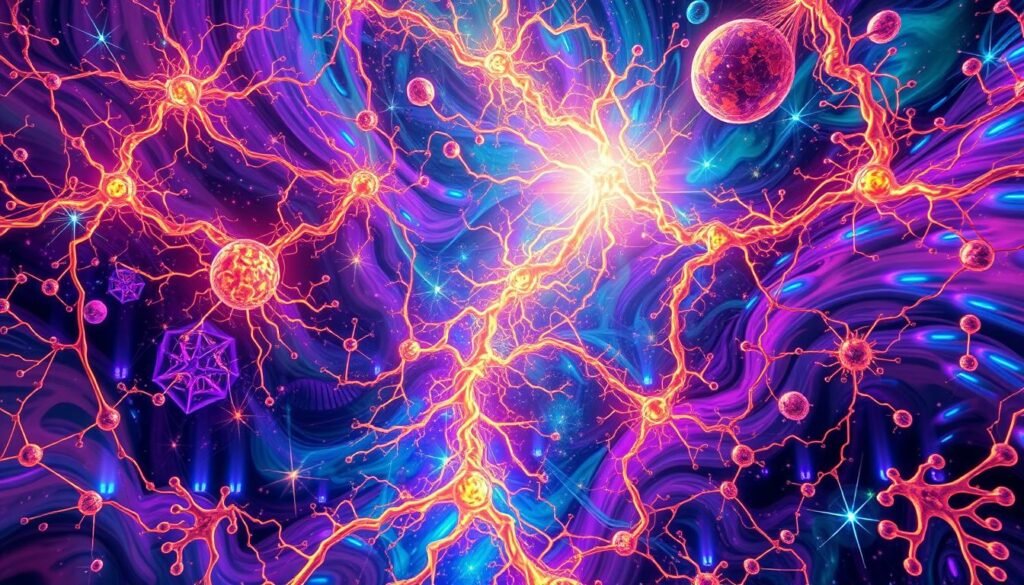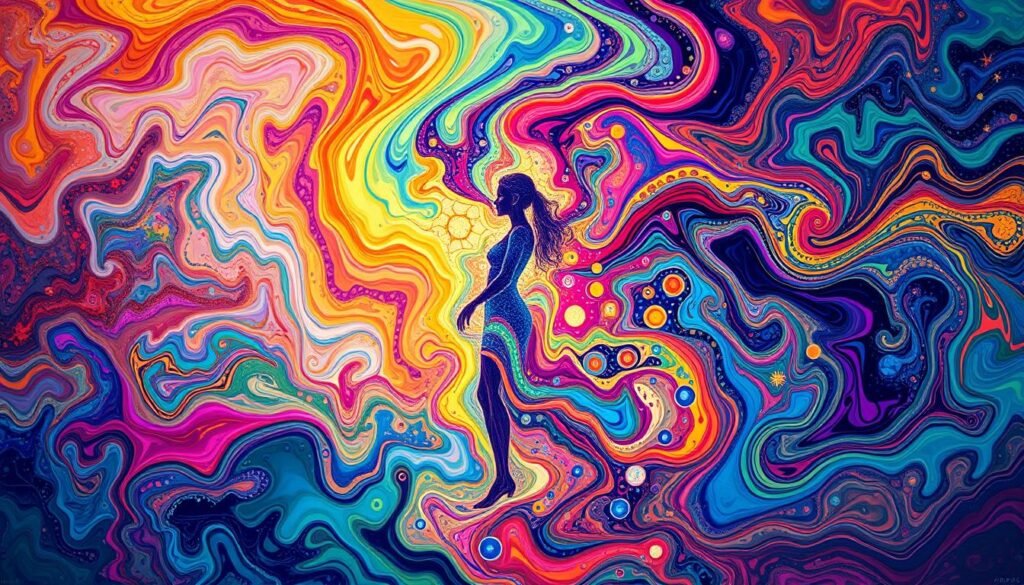Over 300 million people worldwide struggle with depression. This makes it a major public health concern. In the US alone, 10% of adults have been diagnosed with Major Depressive Disorder (MDD) last year. There’s a clear need for new mental health care solutions. Traditional treatments help only about one-third of patients. This leaves many looking for different ways to treat depression.
Psychedelic therapy is emerging as a hopeful option for depression. It includes methods like psilocybin therapy, MDMA-assisted therapy, and ketamine treatment. Research shows psilocybin can quickly improve symptoms of depression. For instance, more than 67% of participants in some studies felt much better one week after treatment. This piece explores how psychedelic-assisted therapy could help those facing depression.
Many patients do not find relief with current depression drugs, up to 50%. The EMBARK model offers a new, structured way to use psychedelic therapy. It focuses on addressing all aspects of depression and provides trauma-informed, culturally aware care. This approach is changing how we treat mental health. For more on this groundbreaking model, click here.
Key Takeaways
- Over 300 million people worldwide are affected by depression.
- Psychedelic therapy for depression may offer a viable alternative for treatment-resistant cases.
- Psilocybin therapy has shown significant promise in reducing depressive symptoms rapidly.
- Innovative treatment models, such as EMBARK, emphasize ethical and culturally sensitive care.
- Current clinical trials indicate high rates of remission following psilocybin treatment.
Introduction to Psychedelic Therapy
Psychedelic therapy is changing the way we treat mental health issues. It blends psychedelic-assisted psychotherapy with expert guidance. People can delve into their minds using hallucinogenic drugs. This method unlocks deep feelings, helping patients heal better.
Studies show psilocybin and MDMA can boost psychotherapy. They encourage deep self-exploration. Users often feel more optimistic and happier afterward. This happens in safe, clinical environments. Their mental health can improve for the long term.
These sessions have a set structure, led by skilled therapists. Research proves they’re safe and effective. They help the brain form new neural connections. More understanding could improve psychedelic-assisted psychotherapy.
We must keep studying the pros and cons of hallucinogenic drugs. This research could help people with depression or PTSD find new strength and healing.
The History of Psychedelic Research
The history of psychedelic research started in the mid-1950s. Tens of thousands of patients tried psychedelic psychotherapy over about 15 years. This time was filled with hope for the treatment of mental health using psychedelics. Osmond and Hoffer treated 2,000 patients for alcoholism. A year later, 40 to 45 percent of them had no relapse after just one large LSD dose.
However, the research faced big problems. By 1968, LSD was banned in the USA. This was mainly because it was linked to counterculture and unrest. So, for 25 years, no human research on psychedelics was done. This stoppage left many questions without answers.
Things changed in the 1990s when research kicked off again in Germany, the USA, and Switzerland. This new start led to studies on the brain and how psychedelics could be used clinically. Early clinical trials suggested that psilocybin and LSD might help with depression, OCD, and addiction to alcohol and tobacco.
In medical settings, these substances lowered anxiety, depression, and addiction issues. These findings sparked more interest in psychedelics’ healing possibilities. Though these studies were small, they showed that psychedelics might have a big role in mental health treatment.
Understanding Psychedelic Substances
Psychedelic substances like psilocybin, MDMA, and ketamine are becoming popular for therapy. They show promise in mental health treatment. Each has unique effects that could change how we help those in need.
Psilocybin: The Magic Mushroom Component
Psilocybin comes from magic mushrooms and is known for sparking big emotional changes. It’s especially good for those with hard-to-treat depression. It works on serotonin receptors, which changes how we perceive things and can help during therapy.
MDMA and Its Therapeutic Potential
MDMA is being looked at for helping with PTSD. It faces legal challenges but could make talking in therapy easier. MDMA helps create a safe space, making it easier to deal with tough memories. This connection is key for using MDMA to help with mental health.
Ketamine: A Standalone Treatment
Ketamine is unique, being the only psychoactive treatment for mental health approved by the FDA. It acts fast, which is great for severe depression. Ketamine quickly reduces depression and suicidal thoughts, and it helps repair brain pathways damaged by mental health issues.
| Psychedelic Substance | Mechanism of Action | Therapeutic Applications |
|---|---|---|
| Psilocybin | Targets serotonin receptors, enhancing sensory input. | Treatment-resistant depression, anxiety disorders. |
| MDMA | Facilitates emotional openness and communication. | PTSD therapy, trauma recovery. |
| Ketamine | Promotes synaptogenesis and neuroplasticity. | Acute depression, suicidal ideation. |
These hallucinogenic substances are changing how we treat mental health disorders. As studies go on, we’re learning more about how they can help. This could lead to new ways to support those in need.
Mechanisms of Action in Depression Treatment
The study of psychedelics has shown new ways to treat depression. They interact with serotonin receptors in our bodies. The 5-HT2A serotonin receptor is very important for the effects of psychedelics.
When psychedelics target these receptors, they boost neurotransmission. This can help make the brain more adaptable, which is vital for fighting depression.
Research has found that drugs like LSD can make people behave better socially. They also feel less anxious and depressed. LSD and SSRIs together first lower serotonin activity. But with more doses, this effect changes, helping fight depression.
Images of the brain show psychedelics change brain connections. This affects areas that change our consciousness. For example, LSD impacts how the thalamus and cortex communicate, leading to profound experiences.
Past traumas can be faced with new understanding during therapy thanks to these changes. Psychedelics also fix damage to dendritic spines caused by stress. This helps build mental strength.
These changes hint at how psychedelics can affect mood and brain adaptations. Studies on psilocybin show it could be a new way to treat depression. For more information, visit this link.

Psychedelics can make the brain more adaptable and less rigid in certain networks. This is linked to better depression outcomes. Unlike traditional antidepressants that target certain brain chemicals, psychedelics offer hope for those who don’t find relief in usual treatments.
For more details, there’s information about ketamine and its role in treating depression here.
Psychedelic Therapy for Depression: Current Clinical Trials
The way we treat mental health is changing fast. This is because of the new use of psychedelic therapy for depression. Clinical trials are looking into psilocybin and MDMA therapy. They show a lot of promise in helping people with severe depression get better.
Breakthrough Therapy Designations
The FDA sees psilocybin as a game changer for treating tough cases of depression. Compass Pathways and the Usona Institute are leading this change. Their major clinical trials have shown great results. They might change how we treat depression forever.
Major Studies on Psilocybin and Depression
Studies on psilocybin have shown it can really help with depression. One big study with 233 people found that just one dose of psilocybin made a big difference. It worked much better than a tiny placebo dose. This is huge because it helps quickly and keeps helping. This gives hope to people who haven’t been helped by other medicines.
MDMA-Assisted Therapy: Challenges and Developments
MDMA therapy has its own set of challenges. Researchers are still figuring out how to use it best, especially for treating trauma. Getting approval and making sure it’s safe to use with talk therapy is tricky. But, there’s ongoing progress. Studies are showing MDMA could be really useful alongside therapy to treat PTSD.
| Study | Type | Findings | Status |
|---|---|---|---|
| Compass Pathways | Psilocybin Trial | Significant improvement in treatment-resistant depression | Completed |
| Usona Institute | Psilocybin Research | Identified psilocybin as a breakthrough therapy | Ongoing |
| MDMA-Assisted Therapy Studies | MDMA Research | Ongoing challenges with regulatory approval | In Progress |
| NIHR Psilocybin Trial | Feasibility Study | Exploring treatment-resistant depression | Underway |
The current trials could change how we treat depression. They offer new hope for those fighting this tough battle.
Integrating Psychotherapy with Psychedelic Treatment
Combining psychotherapy with psychedelic drugs can really boost their healing power. The mix of therapy and the psychedelic journey plays a big part in improving mental health. At the heart of blending them well is knowing about the patient’s mindset and the place where therapy happens. Also, using new methods like the EMBAARK model helps a lot.
The Importance of Set and Setting
Set and setting mean the patient’s mindset and where the therapy takes place. Studies show these are key in shaping how well the therapy works. A welcoming, safe space makes for deeper, healing experiences. If the vibe is off, it can lead to bad results. Making a healing space on purpose helps healers guide patients on a meaningful journey.
EMBAARK: A New Model for Integration
The EMBAARK model gives a clear way to mix psychotherapy and psychedelics. It points out important aspects that lead to success in therapy, making it easier to adjust to each patient’s needs. By linking mental support and the psychedelic trip, EMBAARK stresses the importance of custom, flexible care in therapy.

| Key Elements | Description |
|---|---|
| Set | The individual’s mindset and expectations |
| Setting | The environment where the therapy occurs |
| Therapeutic Alliance | The relationship between therapist and participant |
| Integration Strategies | Methods for incorporating insights from the experience into daily life |
| Flexibility | Adaptation of therapeutic approaches based on participant needs |
Alternative Approaches: Non-Conventional Mental Health Strategies
Mental health treatment is changing. We’re moving past old ways to find new methods that meet different needs. These new approaches focus on the whole person. They understand that what we go through affects our mental health in special ways.
Psychedelic therapy is an exciting example. It combines drugs like psilocybin with support to help fight depression. With just one dose, many see big improvements. MDMA therapy is also showing great promise for treating PTSD. After two sessions, more than half the patients improved so much they no longer fit the PTSD category.
Standard treatments often mean taking antidepressants for a long time, which can have side effects. In contrast, alternative options like ayahuasca offer a different path. They can quickly reduce feelings of depression and thoughts of harming oneself. More research is being done to understand how these therapies work.
There’s a push for treatments that consider the individual. Since everyone is different, it’s key to customize how we treat mental health. This move to new methods marks a big change in how we view and deal with mental health issues.
The Role of Entheogenic Plant Medicines
Entheogenic plants have been key in the spiritual and healing traditions of many cultures. They offer insights for modern medicine. This blending of tradition and science is powerful.
Historical Use in Indigenous Cultures
Indigenous cultures have used plants like peyote and ayahuasca for centuries. These were for spiritual and healing rituals. They helped connect with the spirit world and improve mental health.
This use shows a long history of seeing these plants as tools for change and healing.
Modern Applications and Research
Recently, there’s been a surge in research on these plants’ healing properties, especially for mental health. Studies have found that psilocybin and MDMA could help with psychiatry.
Psilocybin is being explored for treating major depression among other issues. The FDA has marked these psychedelics as potential breakthroughs. This opens doors for more research and trials.

| Entheogenic Plant | Primary Use in Indigenous Cultures | Modern Research Focus |
|---|---|---|
| Peyote | Spiritual rituals, healing ceremonies | Potential treatment for depression |
| Ayahuasca | Healing from trauma, community bonding | Anxiety reduction, depression treatment |
| Psilocybin | Visionary experiences during spiritual practices | Adjunct treatment for mental health disorders |
There’s a growing link between ancient wisdom and science regarding these plants. As misunderstandings clear, we see a shift towards new mental health treatments. This is a hopeful development.
Future Directions for Psychedelic Therapy
The future of psychedelic therapy looks bright as new studies come out and people start to view it differently. There’s talk about making rules better so the therapy can grow. Positive clinical trial results are making healthcare professionals think about using psychedelics more to help with mental health issues.
Potential Regulatory Changes
There’s been a lot of progress in psychedelic research recently. This could lead to changes in the rules. Right now, psychedelics are in a tight spot because of their legal status. But if this changes, we could see more studies and possibly legal use. The U.S. FDA calling psilocybin a “breakthrough” hints at changing views on these drugs for mental health.
In Canada, they’re starting to let some people use psychedelics in special cases. This could pave the way for changes in the U.S. too. More money for research could help a lot. As psychedelics become more accepted for treatment, they could tackle big health issues like depression and suicide that don’t respond to usual treatments.
Even though private companies are putting money into research, there are worries. Issues about who owns the rights to these drugs could make it hard for everyone to get them. The future will likely need new rules and ways to fund research. This is so everyone can benefit from these exciting treatments.
Ethical Considerations in Psychedelic-Assisted Therapy
Psychedelic-assisted therapy brings unique ethical challenges to the forefront. Practitioners must pay close attention to these. Key issues include patient safety, informed consent, and avoiding misuse. The intense experiences psychedelics produce make patients especially vulnerable. This requires strict guidelines to safeguard their health.
The use of psychedelics like psilocybin in therapy needs a solid ethical base. It’s important that patients fully understand the risks and rewards. With the FDA stressing the monitoring of vulnerable states, transparency is key. This ensures patients are kept safe when sessions last up to 12 hours. The importance of patient safety is a major priority.
Another issue is the trust and bond that might form between therapists and patients. Unprofessional attachments or even physical contact during sessions pose big ethical concerns. Review boards are encouraged to add extra measures. These measures protect the rights and well-being of those in psychedelic therapy trials.
There are also ecological and cultural concerns with psychedelic use. The threat of over-using endangered plants and taking Indigenous knowledge is pressing. We need to make sure we respect these substances’ origins and use them wisely. The goal is to achieve meaningful therapy outcomes without harming the environment or cultures.
Conclusion
Psychedelic therapy shows promise for those with hard-to-treat depression. A good amount of people saw real benefits from psilocybin treatments. For them, it opened up new possibilities after traditional methods didn’t work.
There was a notable drop in depression levels right after therapy and later on too. This points to why more research is vital. With over thirty studies on psilocybin now, it’s key to understand how these treatments help over time. Qualitative research is important to ensure therapies really meet patient needs.
The FDA has recognized psilocybin’s potential for treating major depression. This marks an exciting step towards blending medication with comprehensive care. It underscores how critical a supportive therapy setting is for success. Psychedelic therapies might greatly improve life for those battling depression, changing the landscape of mental health care.